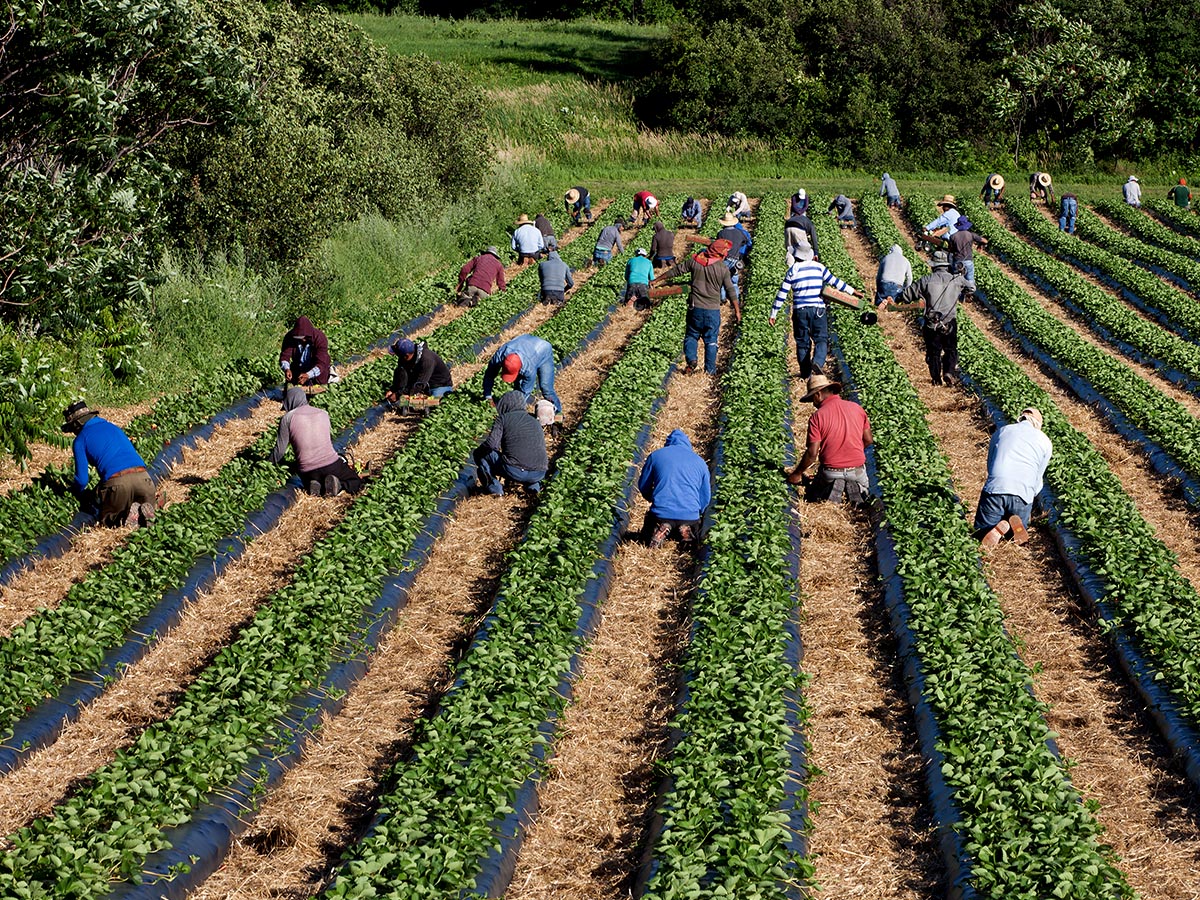Food for life: Cultivating, sustaining and transforming
Improving working conditions for essential migrant farm workers
Intersection: Migration
Improving working conditions for essential migrant farm workers

Canada’s agriculture sector relies on temporary migrant farm workers to fill labour gaps at farms, nurseries and greenhouses, ensuring the security of Canada’s food supply chain. These workers make up nearly 25 per cent of the country’s total workforce in primary agriculture and continue to face many vulnerabilities.
The Fair Farm Work project is an initiative focused on improving living and working conditions for farm workers, examining agri-food systems, migrant labour and exploitation around the world. Led by researchers from Toronto Metropolitan University’s (TMU) Canada Excellence Research Chair in Migration and Integration (CERC in Migration), the project recently published a policy brief addressing these pressing issues in the Canadian context and explored recommendations to alleviate the vulnerabilities of Canada’s migrant agricultural workers, such as social certification programs and regulatory changes.
“Canada’s Seasonal Agricultural Worker Program has been, in the past, heralded as a good seasonal migration policy because it’s regulated,” said professor Anna Triandafyllidou, who leads CERC in Migration. Recruiting migrant farm workers to fill roles unattractive to residents is common in high-income countries with large agricultural sectors, such as Canada, the U.S., Italy, Spain and others, she noted. However, while Canada’s program has clear rules and regulations, she said further scrutiny has revealed problems with housing and work conditions linked to the way the program is structured and implemented.
Typically, migrant farm workers come to Canada with temporary contracts that are tied to a specific employer. If workers are terminated, they risk deportation, as their work status is connected to their legal status in Canada. This link can create an environment where workers can potentially face reprisals for reporting misconduct, wage theft or unsafe work, often choosing to stay silent rather than risk their visa status. Furthermore, inspections and enforcement in the sector, one of the most hazardous in Canada, are not proactive and are predominantly triggered by worker complaints. “The answer to this is how can you improve these conditions,” said professor Triandafyllidou. “There’s more we can do, both in terms of regulating the sector and incentivizing the farmers to improve the conditions.”
Social certifications
CERC in Migration and Integration researcher Erika Borrelli, working alongside professor Triandafyllidou and project partner professor Tanya Basok from the University of Windsor, researched how to alleviate workers’ vulnerabilities beyond government policies. Borrelli investigated the use of social certification initiatives to improve conditions for farm workers.
Through consumer labels, shoppers could select produce from growers and farms certified for complying with ethical labour and housing standards. Professor Triandafyllidou notes that mobilizing civil society can be an effective tool to pressure grocery chains to leverage their relationships with growers and market products that are certified as fair farm work.
With the assistance of the U.S.-based social certification organization Equitable Food Initiative (EFI), Borrelli and TMU researcher Berti Olinto conducted interviews and observed training at a California-certified farm. This certification improves working environments through collaborative leadership teams, enabling worker representation to raise concerns. Borrelli also visited the Coalition of Immokalee Workers (CIW), another certification initiative, to gain additional insight into alternative processes. In Florida, the researchers found CIW’s certification process positively affected workers by informing them of their rights and introducing a grievance mechanism.
Recommendations
In the recent policy brief, Borrelli lists several recommendations to strengthen protections and improve working conditions for migrant farm workers. The recommendations include addressing vulnerabilities created by Canada’s Temporary Foreign Worker Program (TFWP) by allowing open-work permits or sector-wide permits, revising employment legislation to include protections for migrant workers, addressing inspection and enforcement gaps and facilitating non-government initiatives such as EFI’s certification.
“If we want to care for the people who essentially put food on our tables, we have to do something more,” said Borrelli, who is now participating in EFI’s efforts to recruit and certify Ontario farms, with at least three farms already completing the certification process.
If we want to care for the people who essentially put food on our tables, we have to do something more.
The Fair Farm Work research project is a collaboration between TMU professor Anna Triandafyllidou and professor Tanya Basok of the University of Windsor. The research is supported by the Mariam Assefa Foundation, the Canada Excellence Research Chair program and the Social Sciences and Humanities Research Council.
